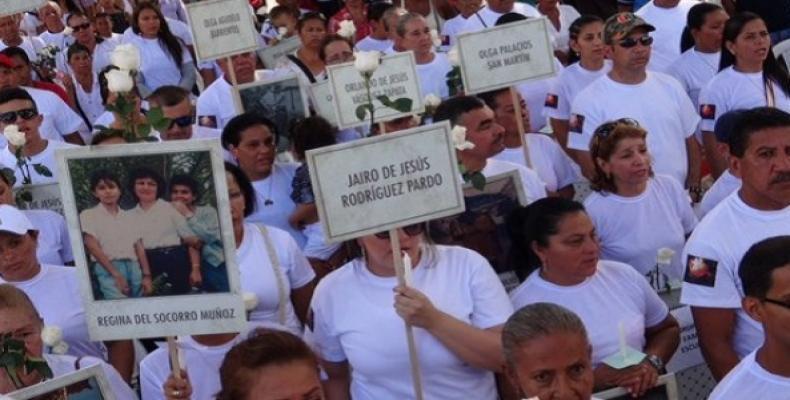Bogotá, December 21 (teleSUR-RHC)-- The Colombian government has accepted and publicly apologized for its role in a 1988 massacre in the town of Segovia, Antioquia, where right-wing paramilitaries opened fire on local residents and killed 43 people.
The government organized a special public ceremony Sunday in Segovia to remember victims of the massacre.
Citizens marched in the street from the cemetery to the town's main park, where various activities were held to raise awareness of the tragic events, including a special mass for the victims, a theater performance, an outdoor screening of a documentary the massacre and a special address by the president’s human rights adviser, Guillermo Rivera.
The Colombian Human Rights Department acknowledged the event on its Twitter account.
On the night of November 11, 1988, paramilitary groups – also known as death squads – entered the town of Segovia and opened fire on citizens in an act of revenge directed at the newly created left-wing Patriotic Union (UP) party, who had won local elections in March.
The paramilitaries reportedly acted under the orders of congressman Cesar Perez, who in 2013 was found guilty by the Colombian Supreme Court of being the mastermind behind the attack. The police and the armed forces were also believed to be complicit in the crime for not stopping the death squads from entering the region nor detaining the murderers.
Paramilitary groups have also long had connections with Colombian lawmakers, dubbed para-politicians, which has resulted in several members of Congress being indicted over the years for colluding with the death squads.
The UP party was aligned with the FARC (Revolutionary Armed Forces of Colombia) guerrillas, launched in 1985 as part of a peace deal made with the government of Belisario Bentancur that sought to end Colombia’s long-running war by way of electoral politics.
However, after the UP won major victories across the county in the 1988 elections, hundreds of party members and their supporters assassinated by paramilitary groups.
The Colombian state's apology for the massacre comes as the FARC and the government of President Juan Manuel Santos continue peace negotiations in Havana, which began in 2012.
The two sides have made some landmark agreements over the years, and are expected to sign a final peace deal in March, 2016, bringing the country one step closer to achieving peace.
Colombia has seen heavy fighting for over 50 years, mainly between government troops, guerrilla groups such as the FARC and right-wing paramilitaries. Over 220,000 people have been killed in the armed conflict and millions more displaced and disappeared.


